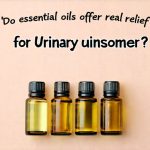Urethral irritation is an incredibly uncomfortable condition affecting many individuals, often manifesting as a burning sensation during urination, frequent urges to go, lower abdominal discomfort, and sometimes even pain. While it’s crucial to identify the underlying cause – which could range from urinary tract infections (UTIs) and sexually transmitted infections (STIs) to allergies, sensitivities to hygiene products, or even certain foods – many people seek complementary approaches to manage the symptoms alongside conventional medical treatments. Natural oils, used cautiously and appropriately, can offer a degree of soothing relief for some individuals experiencing urethral discomfort. This article will explore how specific natural oils might be incorporated into a holistic self-care routine, always emphasizing the importance of professional medical diagnosis and treatment as paramount.
It’s vital to understand that natural oils are not cures for underlying conditions causing urethral irritation; they’re potential supportive therapies designed to alleviate symptoms. Furthermore, the urethra is a sensitive area, and improper use of any substance – even natural ones – can exacerbate the problem or cause further irritation. This article will focus on oils known for their anti-inflammatory, soothing, and gentle properties, but it’s essential to perform patch tests before widespread application and to consult with a healthcare professional before introducing any new element into your self-care regimen. Remember that individual sensitivities vary greatly.
Understanding Oils & Urethral Health
The delicate nature of the urethra necessitates a cautious approach when considering oil applications. The goal isn’t direct application to the urethra itself, which is generally discouraged due to potential for irritation and disruption of natural flora. Instead, oils are typically used externally – in diluted forms on surrounding areas like the lower abdomen, perineum (the area between the genitals and anus), or even through aromatherapy – to promote relaxation and potentially reduce inflammation that contributes to discomfort. Many traditional systems of medicine, such as Ayurveda and herbalism, have long utilized plant-based remedies for urinary health, focusing on balancing doshas or supporting kidney function rather than direct urethral intervention. If you’re experiencing persistent issues, it’s imperative to consult with a healthcare professional for accurate diagnosis and treatment, which is similar to what’s discussed in determining if you have a UTI or just bladder irritation.
Several factors influence how an oil interacts with the body. Carrier oils are crucial – these are base oils like sweet almond, jojoba, or fractionated coconut oil used to dilute essential oils (which are highly concentrated). Essential oils should never be applied undiluted to the skin; they must always be combined with a carrier oil. The quality of the oil matters significantly – opting for pure, therapeutic-grade oils from reputable sources is vital to avoid contaminants or adulteration. Finally, individual sensitivities play a huge role; what works well for one person might cause irritation in another, highlighting the need for patch testing and careful observation.
The potential benefits offered by certain oils stem from their chemical constituents. For instance, chamomile (German or Roman) contains compounds with anti-inflammatory properties, while lavender is renowned for its calming and relaxing effects. Tea tree oil possesses antiseptic qualities, though it requires extreme dilution and caution due to its potency. However, it’s important to reiterate that these are potential benefits based on existing research and traditional uses, not guaranteed outcomes.
Oils Known For Soothing Properties
Several natural oils have a reputation for assisting with comfort when dealing with inflammation or discomfort in the pelvic region. Lavender oil is perhaps one of the most widely recognized, known for its calming influence on the nervous system which can indirectly help manage pain perception and reduce stress associated with chronic irritation. It’s often used in aromatherapy – diffused into the air or added to a warm bath (again, always diluted) – to promote relaxation. Sweet almond oil, as a carrier oil, provides gentle moisturization and is well-tolerated by most skin types. Understanding how to manage discomfort can also be improved by looking at natural ways to reduce flare-up frequency.
Another potentially helpful oil is German chamomile, which contains azulene, a compound with potent anti-inflammatory properties. It’s often used in skincare for sensitive or irritated skin. Again, it must be diluted significantly in a carrier oil before topical application. Fractionated coconut oil is another excellent choice as a carrier because of its lightweight texture and long shelf life; it absorbs readily into the skin without leaving a greasy residue. Always prioritize high-quality oils from trusted suppliers to ensure purity and avoid potential allergens or irritants. Remember, these are supplementary approaches and should never replace medical care.
Utilizing Oils Safely & Effectively
Before introducing any new oil into your routine, a patch test is non-negotiable. Here’s how to perform one:
1. Dilute a small amount of essential oil (one or two drops) in a teaspoon of carrier oil.
2. Apply a tiny dab of the diluted mixture to a discreet area of skin – like the inside of your elbow or behind your ear.
3. Cover with a bandage and leave for 24-48 hours, monitoring for any signs of irritation (redness, itching, rash). If no reaction occurs, you can cautiously consider using it in other areas.
Aromatherapy is often a safe starting point. Using a diffuser to disperse essential oils into the air can create a calming environment without direct skin contact. For topical applications, dilution is key. A general guideline for adults is 1-3% dilution – meaning one to three drops of essential oil per teaspoon (5ml) of carrier oil. Lower dilutions are recommended for children and individuals with sensitive skin. It’s also important to consider reducing friction and pressure on the bladder as part of a holistic approach.
Finally, be mindful of contraindications. Some oils should be avoided during pregnancy or breastfeeding, or if you have specific medical conditions. Always research thoroughly and consult with a healthcare professional before use, particularly if you’re taking medications. It’s also important to note that essential oils can interact with certain medications; therefore, open communication with your doctor is crucial.
Considerations for Specific Applications
When using oils externally around the lower abdomen or perineum, gentle massage can be beneficial. However, avoid direct pressure on the urethra itself. Instead, focus on circular motions around the surrounding area to promote blood flow and relaxation. Warm compresses infused with diluted essential oils (lavender, chamomile) can also provide soothing relief.
It’s critical to maintain good hygiene practices alongside oil application. Regularly clean the perineal area with mild, fragrance-free soap and water. Avoid harsh soaps, douches, or feminine hygiene products that can further irritate the urethra. Consider wearing loose-fitting cotton underwear to allow for breathability and reduce friction. Hydration is also essential – drinking plenty of water helps flush out toxins and supports urinary tract health.
Addressing Underlying Causes & Seeking Professional Help
Natural oils are primarily symptomatic relief tools, not solutions to underlying medical issues. If you’re experiencing persistent urethral irritation, it’s imperative to consult with a healthcare professional for accurate diagnosis and treatment. A doctor can determine the root cause – whether it’s a UTI, STI, allergy, or other condition – and recommend appropriate interventions. Learning how to spot a hidden UTI is also beneficial.
Self-treating without addressing the underlying problem can lead to complications and delay proper care. Treatment might involve antibiotics for UTIs, antiviral medications for STIs, or lifestyle modifications for allergies or sensitivities. Combining conventional medical treatment with supportive therapies like natural oils (under professional guidance) can offer a more holistic approach to managing urethral irritation and improving overall well-being. Remember that self-care is important, but it should always be integrated within a comprehensive healthcare plan. You may also want to review natural oils for external urethral protection as part of your daily routine.





















